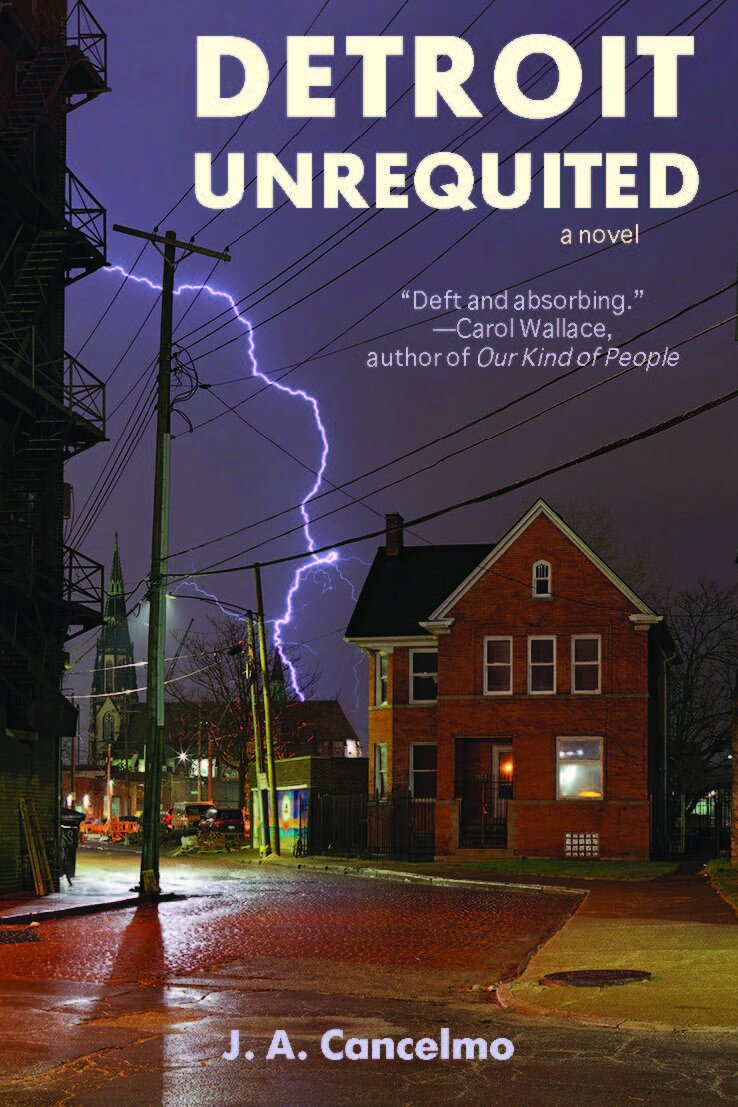detroit unrequited has been named a finalist for the
forward indies book award - mystery fiction
New Interview with author J.A. Cancelmo in Authority Magazine
“How to Go Beyond Your Comfort Zone To Grow Both Personally and Professionally”
© Cover Photo by Dave Jordano davejordano.com
(from A Detroit Nocturne)
detroit unrequited
by j. a. cancelmo
DEBUT NOVEL BY PSYCHOLOGIST EXPLORES A LIFE DERAILED BY MURDER AND TRAUMATIC LOSS
This psychological mystery took shape around the unsolved murder of a college student in 1970s Detroit, and brings readers along in the search for answers, resolution and reinvention.
Tony D’Marino lives a seemingly charmed existence. From immigrant roots to a Harvard MBA, he’s amassed a formidable stock portfolio and owns a sprawling Soho loft with Hudson River views. But images of post-apocalyptic Detroit have triggered a traumatic memory from his college years in the ’70s—memories he can’t live with or without. He’s desperate to reconnect with parts of himself left unfinished when his best friend Roman was left dead by his side. Tony’s return to an officially bankrupt, dystopian Detroit begins with a series of uncanny experiences, with old and new relationships. He’s driven to answer essential questions about the murder and face conflicts around race, maleness, and sexuality left unresolved. Alberta, who has weathered her gender transition, becomes Tony’s muse on this quest. Their deepening relationship helps him to recover a connection to Roman and to his old love, Chaka.
Detroit Unrequited is part psychological mystery and part historical reflection; it is a tale of lives derailed by trauma, and attempts at resolution and reinvention for the characters and for the post-apocalyptic city.
ORDER THE BOOK online at these retailers
Purchase the book in person at these retailers
Listen to the author talk about detroit unrequited in more detail on the Room: A sketchbook for analytic action podcast here
Read a recent book Review of detroit unrequited on the “michigan in books” blog here
Watch the author read an excerpt of detroit unrequited at an RJ Julia / Wesleyan bookstore book signing here
“Detroit is a fascinating city—whether in the 1970s, 2010s, or today—and Cancelmo evokes it with urgency and tenderness."
— Kirkus Reviews
"A John Grisham-like page-turner, a psychological mystery about the protagonist's life changing loss, the traumatic impact of the killing of a college friend in Detroit in the 70s. The narrative, the cadence of words, the period slang make this a most compelling read."
--Janice S. Lieberman, Ph.D., psychoanalyst, social psychologist, and author of Body Talk: Looking and Being Looked at in Psychotherapy and co-author of The Many Faces of Deceit: Omissions, Lies, and Disguise in Psychotherapy with Helen K. Gediman, Ph.D.
“J.A. Cancelmo’s deft and absorbing Detroit Unrequited investigates the complexities of growing up in the turmoil of 1970s Detroit. His complex and likable characters grapple with the big issues: forming an identity, the nature of home, the fault lines of race in our culture. In vivid prose and lively dialogue, Cancelmo shines a light on a specific culture moment that continues to resonate today.”
— Carol Wallace, author of Our Kind of People -- Putnam, 2021
“Tony, a financially successful middle-aged man, mired in alcohol, social isolation, and tenacious survivor guilt, delves into the tragedy that shattered his exciting but chaotic college years in the racially torn, sexually liberated Detroit of the mid-70s. When he returns to Detroit years later, his suspense-filled investigation stirs memories of traumas endured in quiet desperation —the shadows of childhood sexual abuse and the confusion of an unacknowledged love derailed by gun violence. His quest to fully apprehend what happened becomes a passionate search for lost loves and a dormant craving for new ones. Tony’s story toggles between the 70s and the 2010s, but its dialogue with race, post-binary gender identities and desire, and socio-economic disparities are every bit as compelling today. Cancelmo’s prose so vividly paints Tony’s lived experience that it was only at the end did I fully appreciate the depth and complexity of Tony’s struggles. A masterful portrait of one person’s psychological reality in all its contradictions and strivings.”
--Dr. Paul Geltner, psychoanalyst, and author of the acclaimed Emotional Communication in Psychoanalysis.
About the author
J. A. Cancelmo came of age in Detroit of the ’70s. A practicing psychologist, psychoanalyst, and organizational consultant in New York City for the past three decades, Cancelmo understands essential truths about the impact of individual and shared collective trauma. Cancelmo’s professional articles have been published by The American Journal of Psychoanalysis, The British Journal of Medical Psychology, Psychoanalytic Psychology, Psychoanalytic Inquiry, and others; his book credits include Terrorism and the Psychoanalytic Space: International Perspectives from Ground Zero, Pace University Press (2003) Co-Editor with I. Tylim, J. Hoffenberg and H. Myers. Recently, his essays on politics, the pandemic, gender identity, and the enduring impact of trauma have appeared in ROOM: A Sketchbook for Analytic Action. Detroit Unrequited is his first novel.
Author’s Note
This novel took shape around the murder of a college student in Detroit, one of many murders that occurred during The City’s rapid devolution in the 1970’s. The narrative moves between the time of the murder and 2013, the year Detroit was officially declared bankrupt. Both periods were pivotal moments of transition for the main characters and The City. The protagonist’s lifelong struggle to process this intractable trauma and the gentrification of a post-apocalyptic Detroit are parallel narratives in the story.
The 70s was also a transitional phase in the racial composition of the city of Detroit. Neighborhoods became less segregated due to massive white flight. Despite tension between Black and remaining white residents, conversations appeared more frank and direct. White appropriation of Black music and culture created an illusion of greater racial unity in society. Likewise, it was an era of sexual awakening, in gender equality and in beginning acceptance of other than heteronormative identities and lives. This seems in retrospect a more surface manifestation than a true reckoning as has emerged in the past decade with the #MeToo and #BlackLivesMatter movements.
Detroit Unrequited portrays both the characters’ and the City’s struggle to transcend these deeply engrained biases and a shared traumatic past. It is a coming of age tale of lives derailed by traumatic loss, of struggles to mourn and attempts at transformation and renewal for the characters and for the City.


